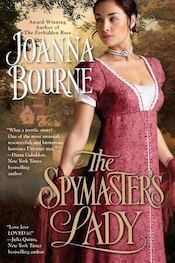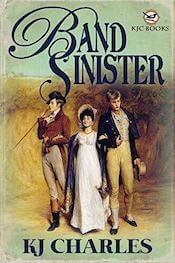Kissing Books: And so…
You’d think a romance author would be better with endings. But the end of a romance is really a beginning in disguise: it’s the start of a marriage, a relationship, a new way for the characters to exist in the world. We stop watching, but it’s implied the characters keep going beyond the limits of the reader’s sight. It’s less that romance authors wrap things up, and more that we set up the premise of an invisible sequel every reader has to imagine for themselves.
I don’t know how to write a happy ending for this one. The Seattle Review of Books and this column are going on hiatus — it’s the right decision for a lot of reasons and the archives will still be accessible. But I don’t know how to write the end because I don’t know what the next part is supposed to look like.
It’s been different doing criticism here rather than on my own site — just like it’s different to sing on stage rather than in your living room. Or to publish books rather than scribble in notebooks that never open for anyone else’s eyes. The public nature of the gig and the proximity to so many other writers from so many different genres has had a bit of a crucible effect, pressure and heat condensing my initial impressions into sharper, steelier, and altogether better ideas. It’s pushed me and I’ll miss it dreadfully.
Lately it feels like everyone is trapped in their own separate crucible. We don’t know how the heat and pressure are reshaping us inside and out. We have to get through each day one year at a time. Those of us who are not essential workers have had to retreat from the world. From one another. We have separated ourselves from ourselves, and the break is severe. (Essential workers are having a vastly different experience of this pandemic, and someday we will shudder at the telling.) The times have changed the way I read some of the books reviewed below; context has cast unexpected shades on certain scenes and premises.
The world is transforming before us, its shape going fluid and ungraspable no matter how tightly we clench our hands.
People have channeled their need to reach out: we are collectively baking and knitting and practicing instruments, learning languages, making films, talking about finishing that novel we’ve been noodling with. We are trying as best we can to take refuge in Art, because we cannot take refuge in each other.
Art is another way of connecting and that absolutely includes romance.
Because the great promise of romance is: the central characters never end up alone. It’s a simple, powerful fact, the one constant of the entire genre. You won’t be alone.
We’re not there yet. We’re in the bleak moment, the rough patch, the stormy night full of misunderstandings and third-act twists and the resurgence of old fears we thought we’d left in the past. The time when the villain’s triumph seems almost complete.
I don’t know how long we’ll be here. Everyone jokes that This season of America has jumped the shark and Someone tell the writers room to cut the murder hornets subplot because stories are how we decide what the world around us means. It’s worth thinking about what stories we tell over and over, what stories we keep close to our hearts. Because those stories are the maps we use to find our way forward.
We talk about the HEA meaning happily ever after — but that’s shorthand. The full unabbreviated line is: And they lived happily ever after. Lately I’m really taking note of how it starts with And they lived.
We’ve got to focus on the living part for now. But we can’t entirely forget what we’re living for.
There is a persistent myth that happiness is a frivolous thing to want. That hoping a protagonist — or a person — will succeed and thrive is simplistic, unrealistic, or unsophisticated. Shameful, almost. Because pain builds character, or shows strength, or some such. Lines about the nobility of suffering seem to fall so easily from the lips of the comfortable. Meanwhile we see queer people in every generation fight for their love to be legal and celebrated, and disabled activists fight against the systems that dehumanize us all. We see people of color find joy together in a world that would erase their existence. We see women in prisons revolt against Shakespeare himself and refuse to perform the suicide scene in Romeo and Juliet. Because those women felt those kids deserve better than what Shakespeare wrote for them. How is this not strength?
When the world wants you miserable, invisible, or dead, it is brave to reach for happiness.
Happiness is about more than comfort. More than basic needs. Food, shelter, and safety must be assumed as a starting point, not as an end goal. Happiness seeks fulfillment, passion, growth, and joy. Happiness doesn’t eat: it feasts.
Happiness is the name we give to the richest, most unconstrained expression of our humanity. We have to value it even when — especially when — it feels most out of our reach.
Until the bleak moment is passed, you can find me on my website, Twitter, or my newsletter. I thank every author whose work has appeared in this column, and every reader who has used it for recommendations or reached out to talk more about their experience with the books featured here. It has been an honor and a privilege and the best gig I’ve ever had.

The Spymaster’s Lady by Joanna Bourne (Berkley: historical m/f):
There is a long and glorious history of romance novels that feature spies during the Napoleonic Wars. If Austen and Brontë are first-generation romance forebears, then Heyer and Orczy are the second, and both loved to send English aristocrats into revolutionary France. Baroness Orczy’s The Scarlet Pimpernel has been perennially popular in various media for almost a century (stage play, novels, various miniseries and movies, a Blackadder episode, a Tony-winning Broadway show with Terence Stamp as the chilly French villain Chauvelin…). Orczy’s novel is light and charming and romantic and lets all its characters keep their idealism mostly intact.
Joanna Bourne takes things in an entirely different direction. Our spymaster and his future lady meet in prison, starved and tortured and frighteningly close to death. You’re going to need all the content notes for this one: sexual assault of the heroine happens right there on the page, though it is short and deeply empathetic as such scenes go. This one of those romances where even though you know they’ll be safe in the long run nobody feels particularly safe at any given moment. It is incredibly dark and for a romance shockingly cynical about the nature of espionage and the personal/moral cost of lying for a cause. There’s a bleak edge to it that would make even Le Carré proud.
Somehow it was exactly what I needed. It has been a month of personal loss and worldwide upheaval. For four weeks I couldn’t read anything more lengthy than a knitting pattern. I kept picking up books and then putting them back down again, unable to react to the words on the page. Then I started Chapter One of this and could not stop until I’d read the whole thing straight through. It was a minor miracle, and one I’ll be grateful for til the end of my days.
Grey lifted her half out of her chair to kiss her, passionately and possessively, hard upon her mouth. It surprised her, but she was more immediately concerned with receiving and hiding the knife he passed to her. As a declaration of affection, the knife did as well as any number of kisses.

He’s Come Undone by Emma Barry, Olivia Dade, Adriana Herrera, Ruby Lang, and Cat Sebastian (self-published: various settings and pairings):
Someday someone is going to publish something very incisive and scholarly about the history of anthologies in romance: publishers have long used them as a vehicle for discovery, putting bestselling names alongside newer or debut authors to cast lures across multiple reader bases. Self-published anthologies and boxed sets have a shorter, wilder existence. But my favorites are the anthologies put together for the passion of the idea — things like Hamilton’s Battalion or the Rogue anthology series. He’s Come Undone is a whole set of stories where stern, starchy heroes are thoroughly unraveled by love and it is a goddamn delight the whole way through.
This is a deep dive into the grumpy one is soft for the sunshine one, but the mix of time periods and pairings kept things fresh and fascinating. I suspect every reader will have their personal favorites (I reveled in Ruby Lang’s “Yes, And…” and Olivia Dade’s murder dioramas and the Secret History-but-queerer-and-happier vibe of “Tommy Cabot Was Here”) but they’re all great short works by authors who know what they’re about. You’re unlikely to find more bang for your romance buck in any other book this spring. Highly, highly recommend.
“Can we agree that we were both idiots —”
“Yes.”
“— And just let bygones be bygones.”
Tommy hated that phrase. He wished he could let one single solitary stupid thing actually be a bygone. Instead he was dredging up every one of his ancient misdeeds and spending days turning it over and looking at it from every angle like a jeweler examining a gemstone. But he nodded anyway.

Chaos Reigning by Jesse Mihalik (Harper Voyager: sci-fi m/f):
The third and final volume in this blaster-filled space adventure romance series lands with a bang. Stakes are high, communications are down, and one well-timed betrayal could bring down an empire. Jumping into this before reading the other books would be like sitting a Star Wars innocent down to watch Return of the Jedi (“Who’s this Darth Vader guy and what’s his deal?”) — especially since these books are intensely heroine-centric. This is very much Catarina’s story, which is fine because she’s wonderfully fun, but readers looking for more of the hero’s side of things might find that Alex’s appearance in the previous volume adds heft to the experience. It’s a neat trick to spend two books introducing the von Hasenberg siblings and then to put them all so thoroughly in peril: we feel Cat’s motivation more strongly because we know these people, and we want them to be safe as much as she does. And unfortunately, the one pivotal scene I most want to talk about is at the end and so spoilery I don’t even dare mention which one it is — so slide into my DMs on Twitter because I have Questions and Feelings and I want to know I’m not the only one.
I threw in Star Wars as a joke and a reference I trusted people to get — but now that I think about it, I have a lot of the same questions about that franchise as well. How do we reconcile superpowers with political powers? How do we balance desire and duty? How much does the public deserve to know about the lives and loves of its leaders — especially a public accustomed to living in a decadent, corrupt, and violent empire? These questions do not feel entirely academic at the moment.
I felt his gaze like a physical weight and fought the prickling awareness trickling through my system. He focused on me intently, but I’d bet half my fortune that he also remained aware of everything else happening in the room and could react in a heartbeat.
What would it take to capture all of his attention?
I shoved the question away. He wasn’t for me. Someday, I would marry for the good of the House, and until then, I preferred my men more manageable.
This Month’s In Case of Emergency, Break Glass Book

Band Sinister by KJ Charles (self-published: historical m/m):
Sometimes you’re so excited by a book, and the reviews make it sound so good, that you end up not reading it. I think of these books as emergency books, things I know I’ll love and can save until a rough time when I need a guaranteed winner of a read.
If these aren’t rough times, what are they?
The pandemic lens actually worked for me here, considering how much of the plot deals with historical medical care and a main character’s fears for his much-loved sister’s survival. Guy’s deep love and his profound fears for Amanda’s health seared the opening chapters of this book. Often rake-seduces-an-innocent pairings can fetishize the innocence in a way that feels squicky: Ah, someone pure and untouched, right here in my lecherous grasp. And our rake, Philip, does find Guy’s innocence charming — but what truly drives Philip into infatuation is seeing how nakedly, painfully caring Guy is. Guy is a sleepless, unshaven, unbalanced, terrified, hopeless mess until his sister is out of danger; Philip, seeing this, wonders what it must feel like to be the object of such forceful affection. Philip might know eighteen different ways to fuck or be fucked and the Latin terms for all of them — as a lapsed classical scholar who has in fact used Catullus’ filthier works to seduce someone I can assure you that the Latin in this book is impeccable — but he doesn’t feel he’s been deeply, truly loved in the way Guy loves. He’s as allured by that promise as Guy is by pleasure, and the results are spectacular.
“It isn’t complicated, in the end,” Philip said. “We eat, drink, and are merry, for tomorrow we die. Be merry with me?”
In place of a fifth book, and as a final farewell, I’d like instead mention the many other books I’m looking forward to in 2020. May these stories fulfill every reader’s highest expectation and bring us solace and sweet release in the months to come.
- The Boyfriend Project by Farah Rochon
- The Spare by Miranda Dubner
- Two Rogues Make a Right by Cat Sebastian
- Recipe for Persuasion by Sonali Dev
- Girl Gone Viral by Alisha Rai
- Starcrossed by Allie Therin
- Her Lady’s Honor by Renée Dahlia
- Deal with the Devil by Kit Rocha
- Something to Talk About by Meryl Wilsner
- Would I Lie to the Duke by Eva Leigh
- How to Catch a Queen by Alyssa Cole
- Slippery Creatures by KJ Charles
- A Duke, the Lady, and a Baby by Vanessa Riley
- Boyfriend Material by Alexis Hall
- If the Boot Fits by Rebekah Weatherspoon
- The Sea May Burn by Rose Lerner